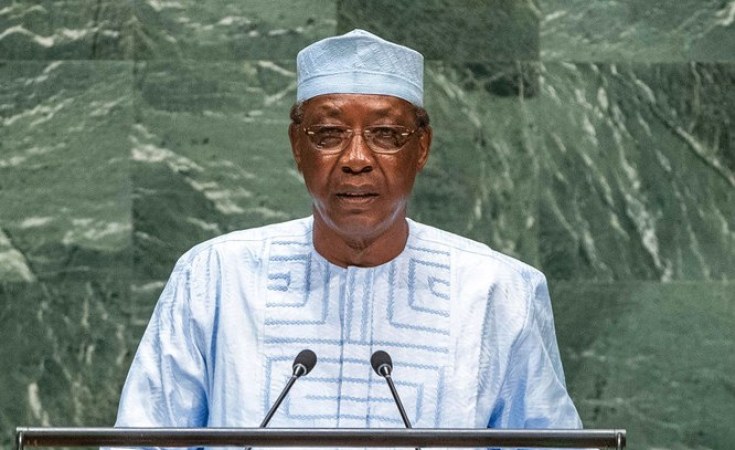Idriss Deby took power in a coup decades ago and died fighting against rebels trying to oust him. Over 30 years, Deby has been a maverick figure in the Sahel region, with friends in the West but enemies close to home.
Idriss Deby, the son of a shepherd who went on to lead his country Chad and become one of Africa's longest-serving heads of state, has died on a battlefield with anti-government rebels. He was 68.
The shock announcement came from the Chadian military, just a day after Deby was confirmed president-elect after securing nearly 80% of the April 11 vote. Meanwhile, Deby's son, Mahamat Idriss Deby Itno, has taken over as interim leader of a transitional military council, the military said.
Deby was born in 1952 in northeastern Chad, in what was then part of the colonial French Equatorial Africa empire. He started his military career in Chad's capital, now known as N'Djamena, before earning a fighter pilot's license in France in 1976.
Rise in the military
Deby joined the rebel army under former leader-turned-president Hissene Habre in 1982, and took command of the army in 1983. He participated in the Toyota War, the last phase of the Chadian-Libyan conflict, where Chadian forces successfully repelled incursions from Muammar Gaddafi's better equipped army using armed Toyota pickup trucks, assisted by French air support.
Support from France would become integral to Deby's future as kingmaker in Chad.
From army chief to rebel fighter
But by the end of the 1980s, Deby's relationship with President Habre had soured to the point where Habre accused Deby of plotting a military coup. Deby first fled to Libya, where Gaddafi welcomed him, and then to Sudan, where he was joined by numerous followers from within Chadian army ranks. Here, Deby built up the Patriotic Salvation Movement, which started launching offensives against the Habre government, and which eventually marched into N'Djamena in 1989.
Taking power
With Habre in exile in Senegal, Deby set about reforming Chad's government. This included incorporating anti-Habre groups into a union.
However, the situation was tense -- there was another coup attempt and Deby's regime cracked down on opposition figures and Habre-allies.
After six years of transition towards democracy, Deby was elected president in 1996 in Chad's first multi-party election, bringing some of the political opposition into government. But his regime could not shake accusations of alleged human rights abuses. He was reelected in 2001 but came under increasing pressure from the opposition after accusations of electoral fraud. A 2005 referendum approved changes to the constitution to remove limits on presidential terms.
France as Deby's joker
Chad's wealth in natural resources such as oil was supposed to pull the country out of poverty. But Deby's regime was accused of using oil revenues to enrich itself and use it to finance its fight against rebellions.
Yet Deby was seen by Western powers as a stable, predictable figure in an increasing war against jihadist fighters in the Sahel region. He also became a key figure in mediating conflict in neighboring Central African Republic and in the Boko Haram insurgency.
Deby allowed France to station troops in Chad, which served his purposes in defending his regime, and allowed France a base from which it could carry out its counter-terrorism operations. Most notable of these was the French-led Operation Barkhane. In 2014, along with Burkina Faso, Mali, Mauritania and Niger, Chad became part of the G5 Sahel joint force to battle jihadist organizations on military and governmental fronts.
Rising anger at poverty
On the home front, though, Deby faced pressure against his increasingly authoritarian regime. Though he won the 2016 election, reports of voter intimidation further tarnished his image. Chad amended its constitution yet again in 2018, expanding the president's powers and increasing presidential terms from five to six years.
Mismanagement and falling oil prices exacerbated poverty and raised discontent in the landlocked country. Chad is one of the world's poorest nations, with two thirds of country's 15.8 million people living in abject poverty, according to the UN's World Food Programme.
As much as Deby was successful in defending himself and his regime, his enemies were never far off. The 2021 election saw violence, with a rebel group calling itself FACT (the Front for Change and Concord in Chad) launching attacks, and over the weekend, there were clashes with the army as the rebels advanced toward N'Djamena.
While his supporters say he strove for peace and was a pan-Africanist, Deby left power in the same way he took it over 30 years ago: in the heat of battle, with a rebel group fighting a corrupt leader.
Blaise Dariustone (N'Djamena) and Sandrine Blanchard contributed to this report.


